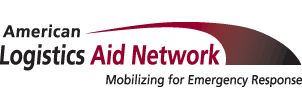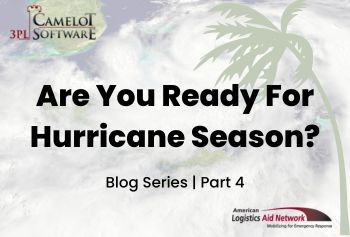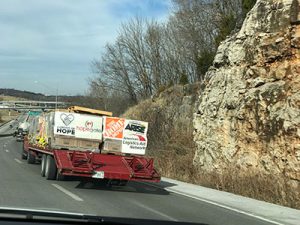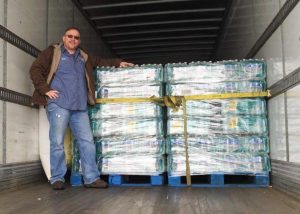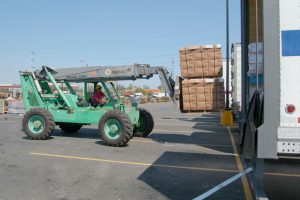We love that you want to help following a disaster. We all want to help in our own ways. But please don’t overthink this… You do not have to be MacGyver and make things up along the way. We’ve all heard stories about food, bottled water and other donations (PPE / hand sanitizer) not making it to the people who needed it most during other crises. There’s no need for you to reinvent the wheel and start a food drive because food may not always end up making it through the proper channels as originally intended.
There are plenty of resources to help guide you in your assistance. So it’s important to simply stick to your hurricane preparation plan, stay in communication with your local emergency response team, and remain resilient in the face of adversity and crisis. This week’s blog will explore how to be helpful after a hurricane makes landfall and not inhibit the professionals who are handling and coordinating resources at the regional or national levels.
Geoff Greenhill, Director of Sales, Camelot 3PL Software
Disaster recovery takes a long, long time. Understandably, following a hurricane, earthquake or related disaster, we often feel the impulse to act now in an attempt to remedy the destruction as soon as possible. But unfortunately, the resulting actions often cause more harm or inefficiency than good. So please heed the below advice and know there are professionals working round the clock to facilitate relief efforts.
Do NOT Self Deploy. DO Find Alternative Ways To Help.
To paraphrase Taylor Swift, self-deploying to a disaster site is “never, ever, ever” a good idea. In addition to the very real possibility of putting your personal safety at risk, it usually disrupts the coordinated work of professional responders, many of whom are already jeopardizing their own safety to reach impacted individuals. You don’t want to be the person who steps in harm’s way and diverts their efforts away from helping those critically in need. So if you want to act, think about:
- Registering with your state volunteer agency. You can participate in work that makes an immediate impact while not endangering yourself or others.
- Joining your local emergency response team. You’ll receive the necessary training to safely and efficiently respond to crises.
- Answering calls for Crisis Cleanup. That way, you can support first responders directly from your own home.
Do NOT Host Or Donate To A Product Collection Drive. DO Make A Financial Donation.
Yes, it’s admirable that you’re willing to part with clothes and home materials. But did you know that unless you donate directly to a registered disaster relief nonprofit that has requested those items, there is a very slim chance your contributions will make it to a disaster site?
Worse yet, all the extraneous product collection drives that pop up following a disaster actually inhibit relief efforts. The collected materials clog supply chains that are already at capacity trying to transport critical resources to the disaster site. And even if they happen to make it to the intended destination, oftentimes there’s no infrastructure in place to store or distribute them.
So please, instead of packing a truck full of miscellaneous supplies, consider donating a useful supply chain service, equipment, or supplies instead. ALAN’s website has a place where you can offer these services and supplies in advance (so please consider pre-registering with us today. We will contact you with more information about how your offer can best be put to use.) Plus, we keep a running list of our current donated logistics needs on our Disaster Micro-site and update it frequently after hurricanes and other disasters, so if you’re looking for good ideas about ways you can help, that’s a good place to start.
Just as important, think about making a financial donation. There are scores of non-profit organizations whose operating budgets are stretched thin trying to supply resources to communities in need. And while we understand that donating money might not feel as gratifying as giving away a tangible item, its impact is greater than you realize.
Take ALAN’s work for example. Every $1 you donate allows us to deliver $72 worth of humanitarian aid, which means your contribution could be the reason a community receives bottled water or life-saving medical supplies. Consider making a donation today. And if you’d like to learn more about how your donations support our work, click here.
Do NOT Despair. DO Take Time To Learn About Current Relief Efforts.
If you, your family, friends or business have been affected by a hurricane, don’t despair. We know the footage that circulates following a disaster is overwhelming and heartbreaking to watch. But there are many non-profit and government entities mobilized to provide help as quickly and efficiently as possible. And they’re doing far more wonderful and effective things than most news channels tend to cover.
Each time you feel that relief efforts aren’t advancing recovery, take time to learn about the organizations and individuals working to deliver aid. For example, check out the stories and completed cases sections of ALAN’s website to read about all the compassionate donors who’ve contributed warehouse space, transportation or material handling equipment following a disaster. Or check out the websites of some of the many compassionate organizations we’ve helped.
The supply chain industry is incredibly generous. If you’re one of those businesses who’ve donated to help non-profits with disaster relief efforts, we thank you for your support. You’ve shown that when hope seems in short supply, humanitarian logistics can make a world of difference.
We are only days away from the start of the Atlantic Hurricane Season, and Super Typhon Mawar is currently threatening Guam. Knowing you spent May preparing to stay safe makes ALAN confident we can weather whatever comes our way.
If you haven’t read the first three installments of our Hurricane Season Preparedness blog series, we encourage you to do so now. And don’t hesitate to reach out with any additional questions or tips for staying #weatherready.
The ALAN Team
